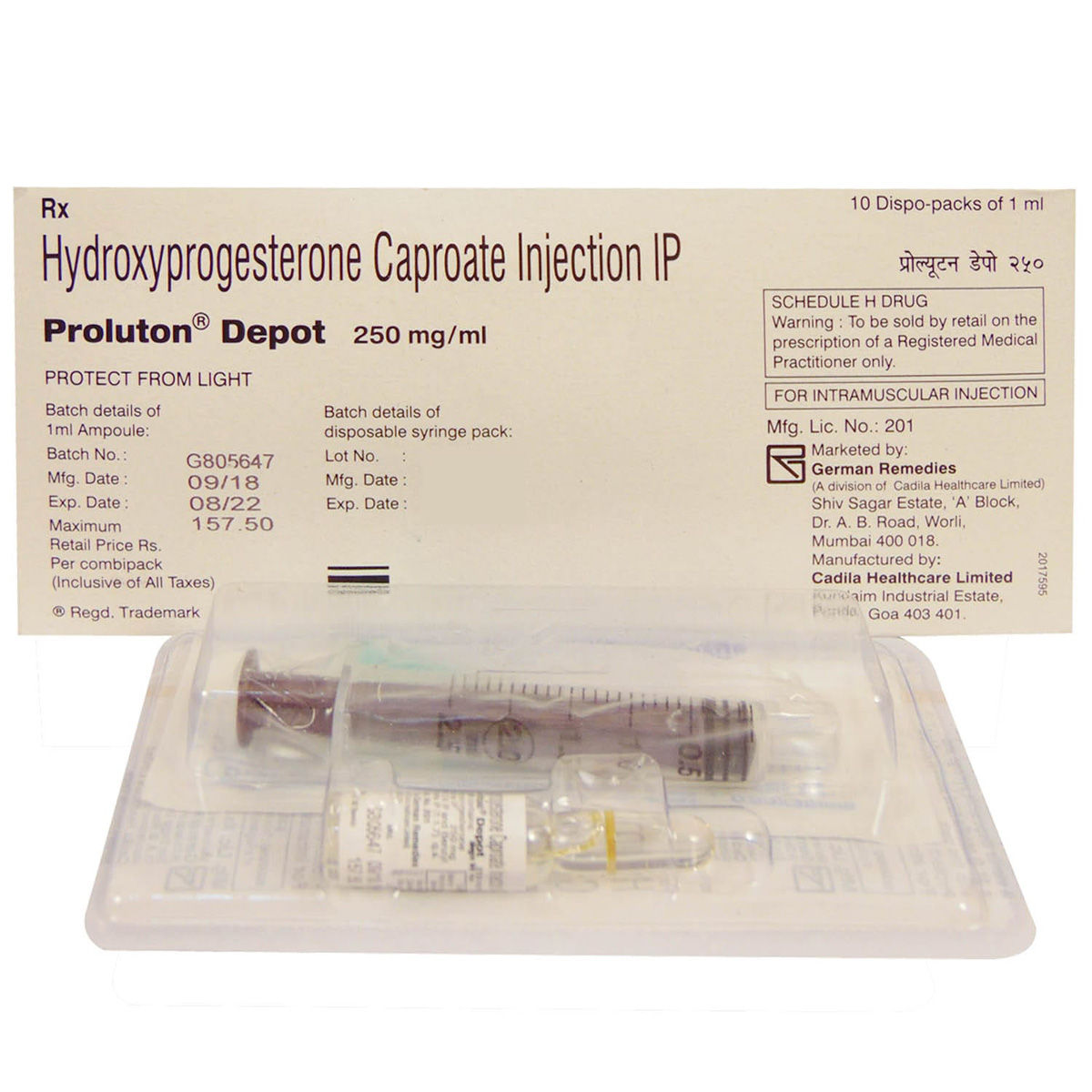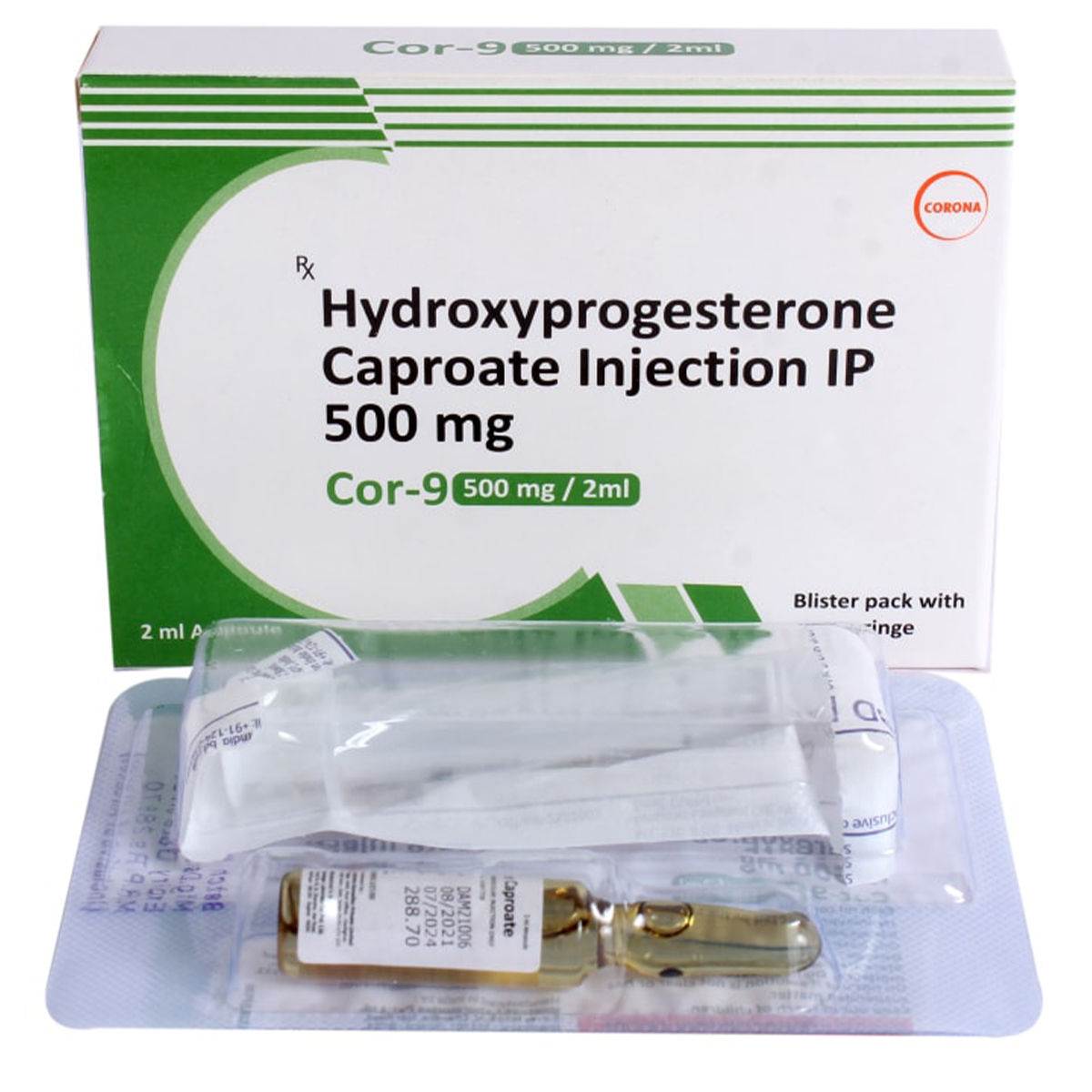Pregquick 250mg Injection
Pregquick 250mg Injection is used to prevent premature labour. It contains Hydroxyprogesterone, which modulates the immune response of pregnant women to prevent rejection of the embryo and allow its attachment to the uterus. It prevents miscarriage and helps lower the risk of premature birth in pregnant women who have had past premature labour. In some cases, you may experience certain common side effects such as nausea, vomiting, itching, hives (skin rashes), swelling in the face, lips, tongue, or throat, and diarrhoea.
₹180*
MRP ₹200
10% off
₹170*
MRP ₹200
15% CB
₹30 cashback(15%)
Free Delivery
With Circle membership
(Inclusive of all Taxes)
This offer price is valid on orders above ₹800. Apply coupon PHARMA10/PHARMA18 (excluding restricted items)
Know Your Delivery Time
Provide Delivery Location

Available Offers
 Prescription drug
Prescription drugWhats That

Secure Payment

India's Most Trusted Pharmacy

Genuine Products
Composition :
Manufacturer/Marketer :
Consume Type :
Return Policy :
About Pregquick 250mg Injection
Pregquick 250mg Injection belongs to the category of a synthetic progesterone female hormone called progestin used to prevent premature labour. Premature labour can start before 37 completed weeks of pregnancy and can be caused by premature rupture of membranes, high blood pressure during pregnancy (pre-eclampsia), and poor diet. Preterm labour symptoms include leaking fluid or bleeding from the vagina, the feeling of pressure in the pelvis, and cramps that feel like menstrual cramps regularly.
Pregquick 250mg Injection contains 'Hydroxyprogesterone', a progestin (female hormones) that modulates the immune response of pregnant women to prevent rejection of the embryo and allow its attachment to the uterus. Pregquick 250mg Injection prevents miscarriage and helps lower the risk of premature birth in pregnant women who have had past premature labour. Pregquick 250mg Injection should be administered only to those pregnant women who are pregnant with one baby or who have had a preterm (premature) delivery of one baby in the past.
Pregquick 250mg Injection will be administered by a healthcare professional. Do not self-administer. In some cases, you may experience certain common side effects such as nausea, vomiting, itching, hives (skin rashes), swelling in the face, lips, tongue, or throat, and diarrhoea. Not everybody experiences these side effects. Most of the side effects of Pregquick 250mg Injection do not require medical attention and gradually resolve over time. Talk to your doctor if you feel any discomfort while taking Pregquick 250mg Injection.
Before starting Pregquick 250mg Injection, please inform your doctor if you have an allergy to any medicines, have unusual vaginal bleeding related to your pregnancy, liver disease, severe hypertension (high blood pressure), or a history of breast cancer, uterus or vagina. Tell your doctor before using Pregquick 250mg Injection if you have had pre-eclampsia (high blood pressure during pregnancy), thromboembolic disorders (blood clot form in the blood), diabetes, depression, or epilepsy. Pregquick 250mg Injection may cause dizziness, so be cautious while driving and operating machinery. Avoid alcohol consumption to prevent unpleasant side effects. Inform your doctor about all medicines you are taking and about your health condition to rule out any unpleasant side effects.
Uses of Pregquick 250mg Injection
Directions for Use
Medicinal Benefits
Pregquick 250mg Injection contains “Hydroxyprogesterone” a progestin (female hormones) that is used in pregnant women who have delivered a baby too early (preterm) in the past. It works by modulating the immune response of pregnant women to prevent the rejection of the embryo and allow its attachment to the uterus. Pregquick 250mg Injection prevents miscarriage and helps lower the risk of premature birth in pregnant women who have had a past premature delivery.
How Pregquick 250mg Injection Works
Storage
Side Effects of Pregquick 250mg Injection
- Nausea
- Vomiting
- Itching
- Hives (skin rashes)
- Swelling in the face, lips, tongue, or throat
- Diarrhea
What if I have taken an overdose of Pregquick 250mg Injection
Drug Warnings
You should not take Pregquick 250mg Injection without a doctor's advice. Before starting Pregquick 250mg Injection, please inform your doctor if you have an allergy to any medicines. Do not take Pregquick 250mg Injection if you have unusual vaginal bleeding that is not related to your pregnancy, liver disease, severe hypertension (high blood pressure), or history of cancer of the breast, uterus or vagina. Tell your doctor before using Pregquick 250mg Injection if you have had preeclampsia (high blood pressure during pregnancy), thromboembolic disorders (blood clot form in the blood), diabetes, depression, or epilepsy. Do not take Pregquick 250mg Injection on your own. Pregquick 250mg Injection can cause dizziness and drowsiness. Use caution while driving a motor vehicle, as dizziness or drowsiness may occur. Let your doctor know if you are a breastfeeding mother. Your doctor will weigh the benefits and any potential risks before prescribing them to you. Pregquick 250mg Injection is not recommended for children younger than 16 years old. Pregquick 250mg Injection is not intended for use in the first trimester of pregnancy.
Diet & Lifestyle Advise
- Eat a healthy and balanced diet rich in vegetables, fruits, and whole grains to reduce the risk of preterm delivery.
- Try to include heart-healthy omega-3 fatty acid-containing food drinks in your daily diet. You can also use low-fat cooking oils like olive oil, soybean oil, canola oil, and coconut oil.
- I prefer whole foods and grains to processed ones. I avoid processed foods and foods high in sugar and fat.
- Avoid stress, as it can increase the chances of preterm delivery. Try to enjoy and spend time with your loved ones to cope with stress and practice mindfulness techniques.
- Regular physical activity and yoga keep you fit, help improve blood circulation, and regulate the oxygen supply, thereby improving your chances of carrying your baby full term.
- Quitting smoking is the best strategy to lower the risk of premature delivery.
- Keep your weight under control.
- Try to avoid alcohol as it can affect your stomach and intestine and limit the absorption of the important nutrients required by your body.
Habit Forming
Therapeutic Class
Pregquick 250mg Injection Substitute

Proluton Depot 250 mg Injection 1 ml
by Others
₹253.00per tabletCor-9 500 mg Injection 2 ml
by AYUR
₹168.75per tabletCor-9 250 mg Injection 1 ml
by AYUR
₹200.70per tabletMaintane 250 Injection 1 ml
by Others
₹188.60per tabletPro-9 250 mg Injection 1 ml
by AYUR
₹318.60per tablet
Product Substitutes
Alcohol
Caution
There is not enough scientific data available for Pregquick 250mg Injection interaction with alcohol, hence it is best to consult a doctor.
Pregnancy
Safe if prescribed
Safe if prescribed.
Breast Feeding
Caution
Please consult your doctor before using Pregquick 250mg Injection during breastfeeding.
Driving
Caution
It is advised to drive with caution after taking Pregquick 250mg Injection as it may interfere with driving capabilities. It can make you feel drowsy.
Liver
Caution
Pregquick 250mg Injection should be taken with caution, especially if you have a history of liver diseases/conditions. Your doctor may have to adjust the dose.
Kidney
Caution
Pregquick 250mg Injection should be taken with caution, especially if you have a history of kidney liver diseases/conditions. Your doctor may have to adjust the dose.
Children
Unsafe
Pregquick 250mg Injection not indicated for use in children. Safety and effectiveness in pediatric patients less than 16 years of age have not been established.
FAQs
Country of origin
Disclaimer
Author Details
We provide you with authentic, trustworthy and relevant information

















